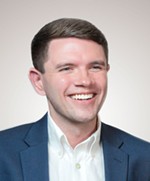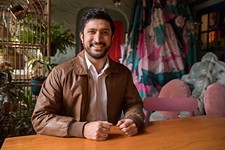A Look at the City Council Races for Districts 2, 4, & 7
As Garza moves on, Pool and Casar seek to stay put
By Austin Sanders, Fri., Aug. 28, 2020
The Nov. 3 election includes five City Council races. We previewed Districts 6 & 10 last week, and here are the other three – an open seat, and two North Austin incumbents.
D2: The Lone Open Seat
As Mayor Pro Tem Delia Garza, one of the original 10-1 Council members first elected in 2014, departs to become the next Travis County attorney come January, the leading candidates to succeed her in Southeast Austin's District 2 – David Chincanchan and Vanessa Fuentes – share many of Garza's priorities. (Also on the ballot are Alex Strenger, who got 1% of the vote in the 2018 mayoral race, and Casey Ramos, who lost to Garza by over 40 points in 2016.)
Fuentes has worked for the past six years at the American Heart Association, advocating for health policy at the state and local level. She says that experience will be invaluable as city leaders continue to address the health and economic consequences of the COVID-19 pandemic.
"I'm looking to serve a predominantly Latino community, which has significant health disparities," Fuentes told us, noting that in Travis County, Latinos continue to suffer disproportionately from COVID-19. "We have limited access to health resources in D2, no full-service hospital east of I-35, and food deserts in the Eastern Crescent. It all comes back to [Austin's 1928 master plan], which had racism etched into it."
To help undo that legacy, Fuentes wants to find ways of bringing historically marginalized communities into Austin politics, perhaps by hosting Council meetings at community centers in different parts of the city and providing child care at the meetings – making it easier for people who don't have access to child care or ways to get to City Hall to participate in city governance.
That participation will be especially valuable as city staff and community leaders work to "reimagine public safety" over the coming months. Both Fuentes and Chincanchan pointed to a report from the Office of Police Oversight that found most of those shot by police in 2018 were Latino men who live in District 2 – making it critical that the district's and city's Latino voices are heard in a conversation that extends beyond budget cuts.
Chincanchan also says that COVID-19 has not only highlighted health and economic disparities in communities of color but has been more widespread and deadly because of those disparities. If elected, he wants to establish a community resilience plan – a process that was started in a resolution introduced by Council Member Leslie Pool in May.
"Community resilience" is an intentionally broad term for policies to provide not just health and safety resources but also safe and stable access to housing and public transportation that serves the needs of vulnerable communities. By beginning preparations now, Chincanchan hopes to prevent further disparate outcomes from public health, economic, or climate catastrophes.
"We've known these disparities were there, but [COVID-19] has really just laid it bare," Chincanchan told us. "We have to learn the lessons of the pandemic and not return to the previous normal, because we know another economic downturn will come, whether it's from another pandemic or climate change. We need a new normal that focuses on equity, protects the most vulnerable, and reduces disparity."
Chincanchan argues that his time at City Hall as an aide to D3 CM Pio Renteria has prepared him to confront the administrative slog that can make it hard to achieve meaningful change in municipal government. With public safety, especially, he says he is hoping to achieve the "far-reaching structural change" that advocates have long sought.
D4 & 7: The Incumbents

In District 7, political newcomer Morgan Witt has stepped up to take on incumbent CM Leslie Pool. Witt, a bilingual education advisor, is leaning heavily into Pool's opposition to Council's votes for revising the Land Development Code. She also pointed to the city's segregationist history of exclusionary zoning, saying that the LDC must be updated to allow for more housing in neighborhoods that "seek to preserve their character" if the city has any hope of achieving equity between racial and ethnic groups.
Witt admits to not being fully up to speed on every policy included in the near-revised LDC, but she's unabashedly in favor of more housing everywhere in the city, including in the Central and North Austin neighborhoods she would represent. "The talk about 'encroaching' on neighborhoods with denser housing implies there are insiders and outsiders," Witt said. "If we're going to be an inclusive community, we need to be thinking about how to make this community more welcoming to others."
Before Pool joined her Council colleagues in unanimously approving a budget that reduced police funding, Witt had seized on the incumbent's reluctance to support calls for $100 million in reductions. Pool says that exemplifies her approach to representing her district; she wanted to talk with advocates on both sides before publicly declaring what she would support. (Pool became an early champion for canceling next year's cadet classes.)
"I was focused on taking the right step for my district," Pool told us. "We are a very tolerant, open, and fiscally conservative district. That's what I am, too." She says her six years of Council experience will be beneficial to "reimagin[ing] public safety" throughout next year, adding that her work on community resilience, which points to ways to address root causes like economic insecurity, could help create a public safety system that's not overly reliant on the police.
As for housing, Pool remains committed to revising the LDC in a way that she says would slow displacement by limiting upzoning in gentrifying neighborhoods – and the more affluent communities she represents. She says the LDC Revision effort was "unnecessarily divisive" and that Council should not "approach zoning as a blanket over the city." She says it would be better for Council to handle zoning changes in smaller chunks, so as to better capture the on-the-ground requests of specific property owners – an approach that would be slower than the broader rezoning Witt favors.

Like Garza and Pool, CM Greg Casar is one of the original 10-1 members, and after opting not to run for the Texas Senate seat now held by Sarah Eckhardt, he appears to be cruising to reelection. He has raised massive amounts of money, he has about as high a profile as a local politician can achieve, and he trounced his opponent Louis Herrin III by more than 44 points when they met in 2016. (Ramesses II Setepenre is also in this year's race.)
If reelected by voters in Northeast Austin's District 4, Casar sees a new term as an opportunity to move beyond smaller, incremental change into broader, more foundational transformation to how the city operates. "Too often Austin settles for progressive branding rather than doing the hard work of racial and economic healing," he told us. "We have gone from taking incremental and important steps to actually making transformative change. But we're not there yet. We still are swimming upstream of the status quo, but I hope that with this movement and this moment we can make longer lasting change."
Got something to say? The Chronicle welcomes opinion pieces on any topic from the community. Submit yours now at austinchronicle.com/opinion.








